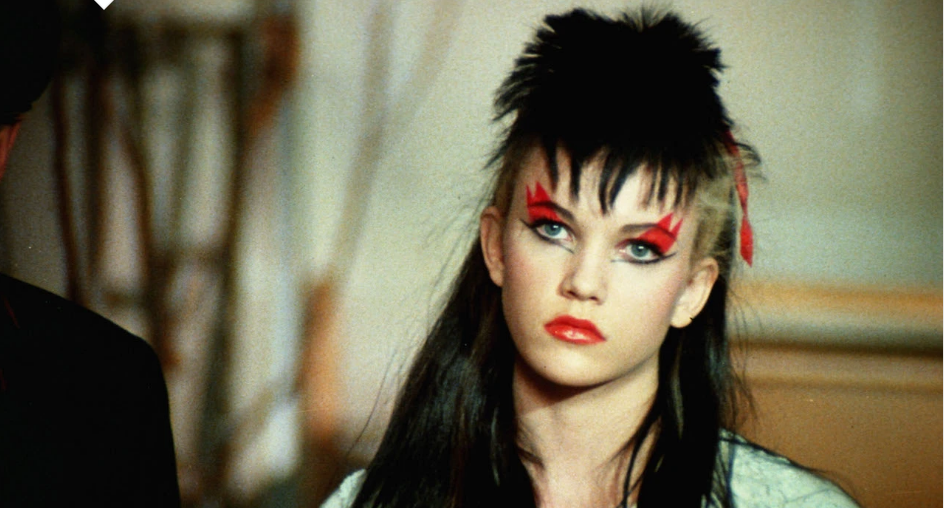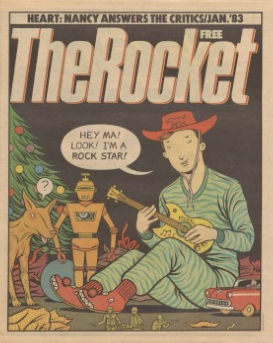QUERELLE
(Rainer Werner Fassbinder, Germany, 1982, 108 minutes)
Even by Rainer Werner Fassbinder's standards, Querelle is one odd film.
Adapted from the 1947 novel, Querelle of Brest, by the brilliant Jean Genet--and featuring then-scandalous illustrations by the equally brilliant Jean Cocteau--it's a hothouse melodrama about queer desire and criminality.
In Edmund White's monumental 1993 biography, Genet, he proclaims Querelle the French writer's "strongest book," explaining that, "Its themes are doubling, repressed homosexual desire, and violence." These themes in and of themselves were not unusual for either author or director, except Fassbinder renders every detail in an intentionally artificial manner.
After 1978 psychological thriller Despair with Dirk Bogarde, an adaptation of Nabokov's 1934 novel, it was Fassbinder's second feature film in English (though 1981's Lili Marleen was shot in English, it was dubbed in German).
Since he filmed in Europe with a European cast and crew, I wouldn't say he had gone Hollywood, but both films feature an English-speaking lead. In this case, American actor Brad Davis, best known for Alan Parker's Midnight Express, plays the title character, a French sailor, drug dealer--and murderer. Though Davis did not identify as gay, there's nothing shy or timid about his performance. The guy absolutely went for it.
I'm certain that the filmmaker found Genet's novel meaningful, not least since his filmography is populated by sexually-repressed criminal types, but he uses every trick in the book to keep us at arm's length from these characters. From Querelle on down, none of them are asking audience members to love them, but it's a feature, not a bug.
As Fassbinder said of Sirk's 1956 Southern Gothic melodrama Written on the Wind, "The good, the 'normal,' the 'beautiful,' are always utterly revolting; the evil, the weak, the dissolute arouse one's compassion."
In addition to the quotes that serve as chapter headings, most from Genet's novel, an uncredited American actor shares the narration with Franco Nero's Lieutenant Seblon. The Italian actor had costarred with Fassbinder in Wolf Gremm's cyberpunk thriller Kamikaze '89, they hit it off, and that's how the spaghetti western icon ended up in the film. Seblon is in love with Querelle, and spends most of it spying on him. He also keeps a tape recorder hidden in his coat to record their conversations, so he can play back the sound of his lust object's voice in the privacy of his own quarters.
All of the action takes place in a set-bound recreation of the port town of Brest.
A matte painting--or series of paintings--provides the backdrop, everything is bathed in a sulfurous golden glow, and instead of gargoyles, the brick wall separating land from sea features phallic buttresses, in addition to colorful graffiti.
It's as stylized, and as delightful, as Barbara Baum's costume design, from the jaunty red pom-poms topping the sailors' caps to the crystals adorning Jeanne Moreau's ears, neck, wrists, and hands as shot by frequent Fassbinder DP Xaver Schwarzenberger in the vein of Eduard van der Enden's work for Harry Kümel's Daughters of Darkness. In that 1971 erotic horror film, every candle and every sequin on Delphine Seyrig's show-stopping silver gown generates star-shaped sparkles (in a manner of speaking, Querelle qualifies as erotic horror, too). It's an in-camera effect you rarely see nowadays, and adds to the bleary, smeary, hyper-real atmosphere.
Nouvelle vague icon Moreau (Elevator to the Gallows, Jules et Jim) plays Lysiane, madam and owner of the Hotel Feria bar with her husband Nono, played by Günther Kaufmann, a Black German actor—and sometime Fassbinder lover—who appeared in 14 of his films.
Querelle has barely arrived when he reconnects with his brother Robert (Hanno Pöschl), a Feria regular, and offers to sell opium to Nono, who also tends bar. In the course of the transaction, he stabs his accomplice Vic (Dieter Schidor), a fellow sailor, to death--and licks the blood from the wound, thus confirming his nature as a sort of living vampire. Though he claims he's looking for "broads," he ends up having aggressive, sweaty sex with Nono, who uses it more as a means of control than pleasure. Though his every action suggests otherwise, Querelle insists, "I'm no fairy."
Throughout the film, Lysiane sings a song that rests on one line, extracted from an 1898 poem by Oscar Wilde--who was almost as familiar with penitentiary life as Jean Genet--and set to music by composer Peer Raben: "Each man kills the thing he loves." It isn't great, but it's far from terrible. Nonetheless, the party poopers behind the Golden Raspberries nominated it for worst song. To add insult to injury, they nominated Raben for worst score, though the woozy chorus of male voices fits the theme perfectly. (The film lost in both categories to Pia Zadora bomb The Lonely Lady.)
Though Querelle literally gets away with murder, his friend Gil (Pöschl again), who stabs another sailor to death, does not. The fact that the same actor plays both brother and potential lover adds an element of incestuousness, which may or may not have been Fassbinder's invention. After his arrest, Querelle offers to help Gil escape by setting him up with a change of clothes and a ticket to Bordeaux.
Before Gil's departure, the two share a kiss, and Querelle confesses, "I never loved a boy before, and you're the first one." It's the only truly tender moment in the entire film, but as the omniscient narrator adds, "He didn't know how to fuck a guy. The gesture would have embarrassed him."
Up until that point, Querelle had never initiated queer sexual activity; his encounter with Nono was his first time with a man. As the film ends, he's still among the living and still free, but I wouldn't say it's a happy ending.
In the novel, Genet sums up Querelle as follows: "He had appeared among them with the suddenness and elegance of the Joker in a pack. He scrambled the pattern, yet gave it meaning."
He could almost be describing the director. As Robert Horton wrote in 1983, "Fassbinder seemed to want nothing so much as to disturb us; in his films, when people start feeling comfortable, they start to fade away. Querelle may make you feel many things, but comfortable isn't one of them."
Just two months before Querelle's premiere, and after making 40 films in 15 years, the hard-living director would pass away at the age of 37. Only nine years later, Brad Davis would pass away at 41, seven months before the premiere of Robert Altman's The Player. It would mark his final film role.
Querelle is an odd film to be sure, but it's a beautiful one, too, filled with unforgettable imagery. Compared to more recent queer films, like João Pedro Rodrigues' O Fantasma or Alain Guiraudie's 2014 Stranger by the Lake, it isn't especially explicit, but in every other way, it's among the most deliriously homoerotic films ever made--and I didn't even mention Marco (co-writer Burkhard Driest), the corrupt cop dressed as a Tom of Finland-style leather daddy with a cap spelling out the word P-O-L-I-C-E--a possible nod to the B-O-Y caps that were all the rage in the 1980s and 1990s.
Rainer Werner Fassbinder may have died before his time, but there's no doubt he was having F-U-N right up until the very end.
Querelle opens at Northwest Film Forum on Aug 30. Fri and Sat screenings introduced by Navid Sinaki, author of queer Iranian noir romance Medusa of the Roses. Click here for tickets. Querelle is also available from Criterion Collection. The new release includes a behind-the-scenes documentary from Wolf Gremm and a video essay from Michael Koresky. (The film looks fantastic, though it could really use a commentary track.) Images from Janus Film (Brad Davis), Amazon (Genet: A Biography, Vintage, 1994), the IMDb (Franco Nero and Jeanne Moreau), and Cinema Delirium (Davis with Burkhard Driest and Günther Kaufmann and Davis with Hanno Pöschl).


































